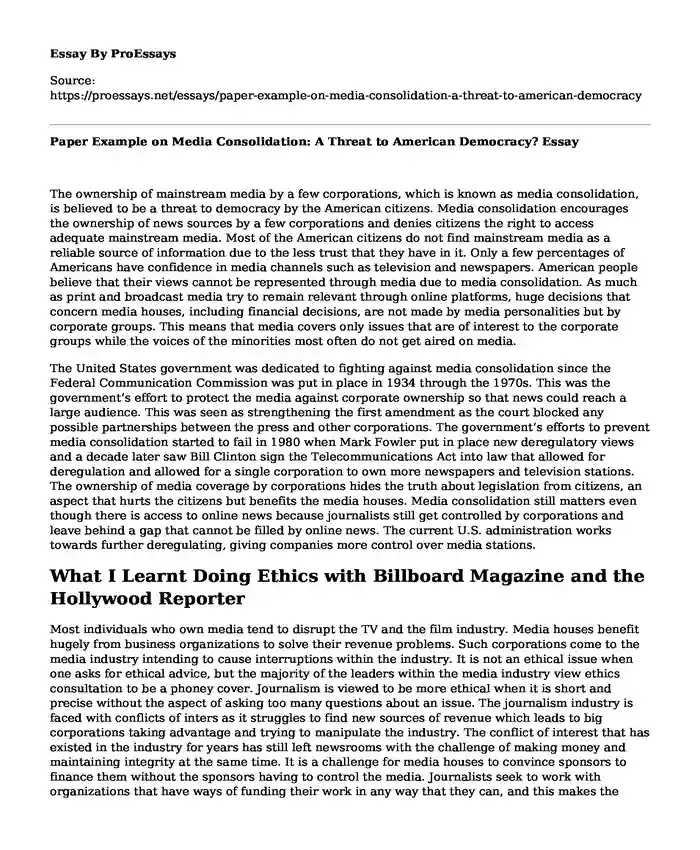The ownership of mainstream media by a few corporations, which is known as media consolidation, is believed to be a threat to democracy by the American citizens. Media consolidation encourages the ownership of news sources by a few corporations and denies citizens the right to access adequate mainstream media. Most of the American citizens do not find mainstream media as a reliable source of information due to the less trust that they have in it. Only a few percentages of Americans have confidence in media channels such as television and newspapers. American people believe that their views cannot be represented through media due to media consolidation. As much as print and broadcast media try to remain relevant through online platforms, huge decisions that concern media houses, including financial decisions, are not made by media personalities but by corporate groups. This means that media covers only issues that are of interest to the corporate groups while the voices of the minorities most often do not get aired on media.
The United States government was dedicated to fighting against media consolidation since the Federal Communication Commission was put in place in 1934 through the 1970s. This was the government’s effort to protect the media against corporate ownership so that news could reach a large audience. This was seen as strengthening the first amendment as the court blocked any possible partnerships between the press and other corporations. The government’s efforts to prevent media consolidation started to fail in 1980 when Mark Fowler put in place new deregulatory views and a decade later saw Bill Clinton sign the Telecommunications Act into law that allowed for deregulation and allowed for a single corporation to own more newspapers and television stations. The ownership of media coverage by corporations hides the truth about legislation from citizens, an aspect that hurts the citizens but benefits the media houses. Media consolidation still matters even though there is access to online news because journalists still get controlled by corporations and leave behind a gap that cannot be filled by online news. The current U.S. administration works towards further deregulating, giving companies more control over media stations.
What I Learnt Doing Ethics with Billboard Magazine and the Hollywood Reporter
Most individuals who own media tend to disrupt the TV and the film industry. Media houses benefit hugely from business organizations to solve their revenue problems. Such corporations come to the media industry intending to cause interruptions within the industry. It is not an ethical issue when one asks for ethical advice, but the majority of the leaders within the media industry view ethics consultation to be a phoney cover. Journalism is viewed to be more ethical when it is short and precise without the aspect of asking too many questions about an issue. The journalism industry is faced with conflicts of inters as it struggles to find new sources of revenue which leads to big corporations taking advantage and trying to manipulate the industry. The conflict of interest that has existed in the industry for years has still left newsrooms with the challenge of making money and maintaining integrity at the same time. It is a challenge for media houses to convince sponsors to finance them without the sponsors having to control the media. Journalists seek to work with organizations that have ways of funding their work in any way that they can, and this makes the journalists work for the interest of the sponsors. As much as revenue leaders and newsroom leaders have to work hand in hand, this does not provide a platform for them to abandon values. The editorial strategies must evolve alongside the evolution of business strategies. Journalists have realized that their strategy as editors must include more appealing content than what they used to offer in the past. The salespeople need to move from selling uncontroversial news that they feel is more appealing to buyers to credible and independent news. Business owners that get to be in charge of the newsroom are sceptical about any ethical questions that they get to be asked by journalists.
Questions
- Why is media consolidation an issue that should concern the public?
- What factors led to media consolidation?
- Can newsrooms depend on business people for revenue without putting at risk the ethical standards?
Cite this page
Paper Example on Media Consolidation: A Threat to American Democracy?. (2023, Sep 22). Retrieved from https://proessays.net/essays/paper-example-on-media-consolidation-a-threat-to-american-democracy
If you are the original author of this essay and no longer wish to have it published on the ProEssays website, please click below to request its removal:
- Political Science Essay: The Concept of Democracy
- Case Study: Psychological Assessment Tool and Evidence Intervention for Russell Todd in the Movie "Beaconsfield"
- Ethical Principle Application Paper Example
- The United States (U.S.) Involvement During World War 2 Essay
- Essay Example on GDP: Key Statistics for Economists & Policymakers
- Essay on Border Security: An In-Depth Analysis of U.S. Immigration Issues
- Essay Example on Grow Business with GYB & DYB: Augmenting Business Sustainability







